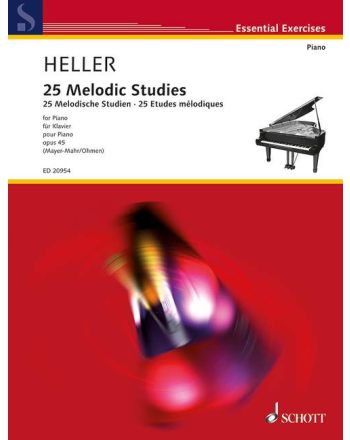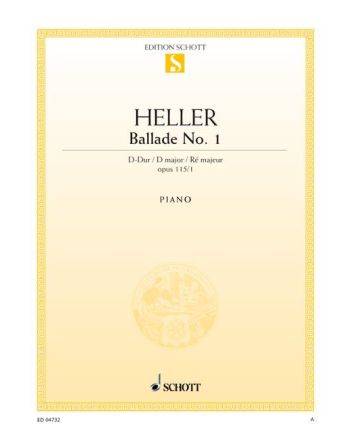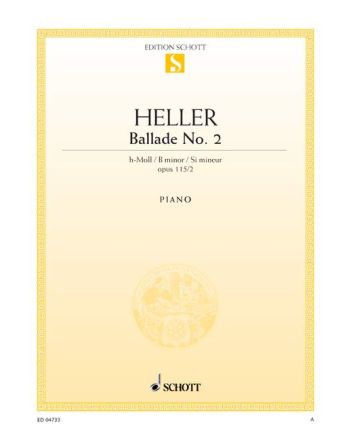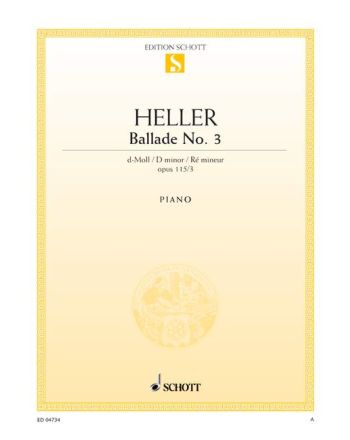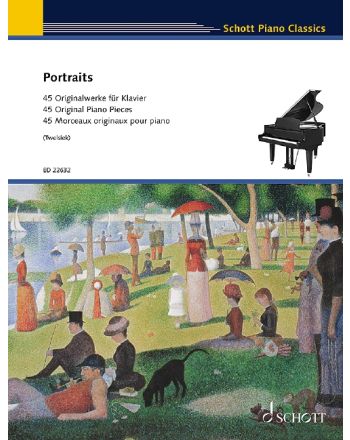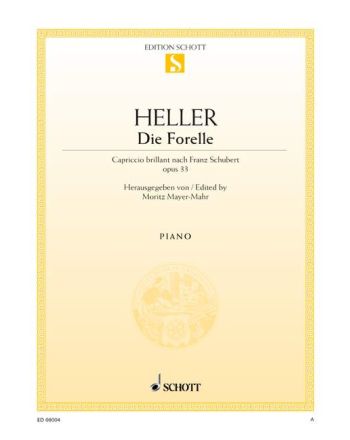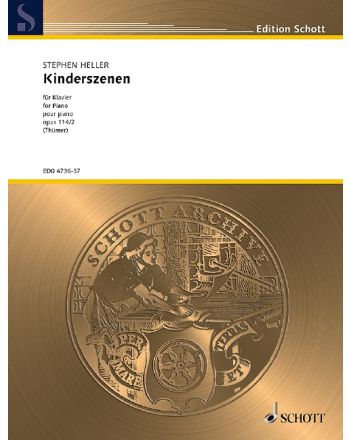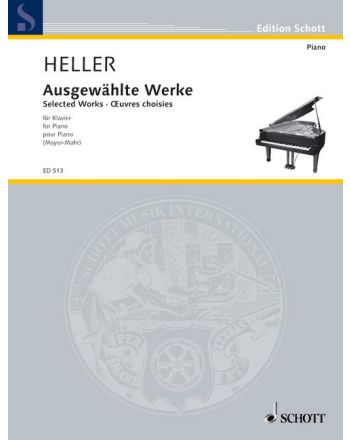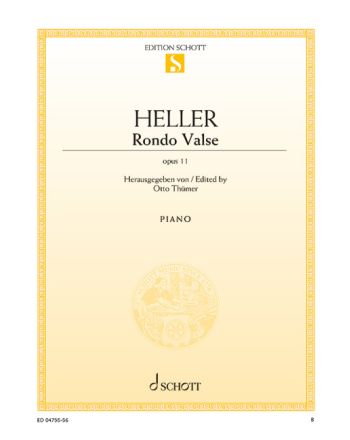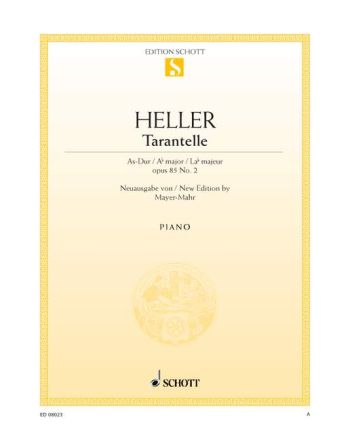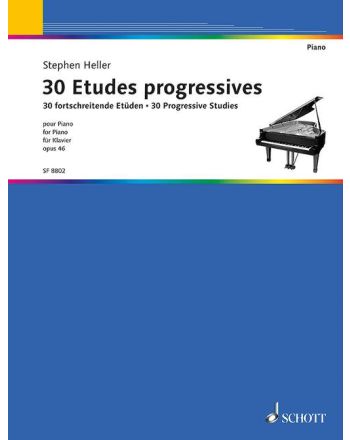Stephen Heller
Pays d'origine:
Hongrie
Date d'anniversaire:
15 janvier 1813
Date de décès:
15 janvier 1888
À propos de Stephen Heller
Stephen Heller was born at Buda-Pesth, on the 15th May 1814 and died in Paris on the 14th January 1888. His musical talent showed at an early age. In 1824 his father took him to Vienna, where he studied music with Anton Halm, the noted piano-teacher. In 1827 he began giving concerts now and then in Vienna, until in 1829 he set out on a concert-tournée through Germany, where he remained from 1830-1838. On his return he broke the journey in Augsburg. It was during this time that he attracted the attention of Schumann, who wrote him up in his “Neue Zeitschrift für Musik” (New Musical Journal). Like many other foreign artists of his time, attracted by the then leading musical city of the world, Heller went to Paris, where he settled for good, and was soon received into a society of friends consisting of such musicians as Chopin, Liszt, Berlioz and others, and where he in a very short time made a name for himself as a pianist and teacher.Heller belongs to the post-romantic School; he wrote exclusively for the piano (more than 150 works), and he is a master-composer of lyrico-poetic pieces. Compared with his great contemporaries, he can scarcely be said to have attained to the height or the sublime passion of a Robert Schumann, whereas he surpasses Mendelssohn in his choice of subjects and ideas exactly suited to his own peculiar and characteristic style of composition, and differing from Chopin by greater simplicity of harmony and precision.
In spite of his spirited nature and the many varied, stimulation influences of the musical life in the French capital, Heller could not be brought to abandon his own style,; he remained true to German sentiment and inspiration; German spirit pervades all his works from beginning to end. Being a true romanticist, he chose the subjects of his compositions chiefly from nature. And although it was impossible to free himself entirely from the influence of the prevalent power of, and taste for, drawing-room music, which he tried to suit to southern forms of dances, in which he produced excellent work, he still only really excels in those of his compositions which, permeated with German spirit and German depth of thought, an by virtue of their naturally romantic character, constitute his best and most characteristic works. In contrast to Theodor Kirchner, with whom he may in some respects be said to be congenial of mind, Heller’s works, even down to the very last, preserve that light mood of gracefulness of spirit which was the natural outcome of a mind ever fresh and bright with the sunniness of a character they all reflect. Besides a large number of greater compositions, we must mention his unperishable, melodious Etudes op. 45 to 47, and op. 16 and 19, in which he proves himself to be not only an experienced pedagogue, who has kept pace with the progress o his time, but also a ton-poet of the purest water, gifted alike as a finely sensed musician, and endowed with as glorious and fertile an imagination and great depth of thought, as but few of his contemporaries.
Produits
-
Compositeur: Stephen HellerEditeur: Moritz Mayer-Mahr | Wilhelm OhmenSérie: Essential Exercises
Instrumentation: pianoNuméro du produit: ED 20954Type de produitEn stockPrix à partir de 11,99 €TTC -
Pour servir d'introduction aux Études op. 16Compositeur: Stephen HellerMedia Type: Partition électronique en PDFInstrumentation: pianoNuméro du produit: EE 313 Q43169Partition PDFPartition PDFEn stock8,99 €TTC
-
Compositeur: Stephen HellerSérie: Schott Archive
Instrumentation: pianoNuméro du produit: BSS 18939Type de produitEn stockPrix à partir de 9,99 €TTC -
Type de produitEn stockPrix à partir de 3,99 €TTC
-
Type de produitEn stockPrix à partir de 3,99 €TTC
-
Type de produitEn stockPrix à partir de 3,99 €TTC
-
Compositeur: Stephen HellerMedia Type: Partition électronique en PDFNuméro du produit: ED 22632 Q51918Partition PDFPartition PDFEn stock2,99 €TTC
-
Compositeur: Stephen HellerMedia Type: Partition électronique en PDFNuméro du produit: ED 22632 Q51917Partition PDFPartition PDFEn stock1,99 €TTC
-
Capriccio brilliant after SchubertCompositeur: Stephen HellerEditeur: Moritz Mayer-MahrInstrumentation: pianoNuméro du produit: ED0 8004Type de produitEn stockPrix à partir de 3,99 €TTC
-
Une sélectionCompositeur: Stephen HellerArrangeur: Gerhard PucheltMedia Type: PartitionInstrumentation: pianoLangue: Allemand, Français, AnglaisNuméro du produit: RL19210Format papierFormat papierEn stock16,00 €TTC, hors expédition
-
Type de produitEn stockPrix à partir de 4,99 €TTC
-
(Op.138, No. 19)Compositeur: Stephen HellerEditeur: Monika TwelsiekMedia Type: Partition électronique en PDFNuméro du produit: ED 9044 Q23266Partition PDFPartition PDFEn stock2,99 €TTC
-
Type de produitEn stockPrix à partir de 4,99 €TTC
-
Compositeur: Stephen HellerEdition: Edition séparéeInstrumentation: pianoNuméro du produit: ED0 4736-37Type de produitEn stockPrix à partir de 4,99 €TTC
-
(from 24 Etudes for the Young op. 125/2)Compositeur: Stephen HellerEditeur: Monika TwelsiekMedia Type: Partition électronique en PDFInstrumentation: pianoNuméro du produit: ED 9045 Q23291Partition PDFPartition PDFEn stock1,99 €TTC
-
Compositeur: Stephen HellerEditeur: Moritz Mayer-MahrSérie: Edition Schott
Instrumentation: pianoNuméro du produit: ED 513Type de produitEn stockPrix à partir de 17,99 €TTC -
Type de produitEn stockPrix à partir de 4,99 €TTC
-
Opus 45 & Opus 46Compositeur: Stephen HellerMedia Type: Partition avec Fichiers audio en ligneEdition: Recueil de pièces instrumentales, Hal Leonard Student Piano LibraryInstrumentation: pianoLangue: AnglaisNuméro du produit: HLE 296587Format papier + Fichiers audioFormat papier + Fichiers audioÉpuisé19,99 €TTC, hors expédition
-
(from Miscellanées Op. 40, No. 3)Compositeur: Stephen HellerEditeur: Monika TwelsiekMedia Type: Partition électronique en PDFInstrumentation: pianoNuméro du produit: ED 9043 Q23180Partition PDFPartition PDFEn stock2,99 €TTC
-
"Avalanche"Compositeur: Stephen HellerEditeur: Monika TwelsiekMedia Type: Partition électronique en PDFInstrumentation: pianoNuméro du produit: ED 9049 Q13322Partition PDFPartition PDFEn stock2,99 €TTC
-
Compositeur: Stephen HellerEditeur: Monika TwelsiekMedia Type: Partition électronique en PDFInstrumentation: pianoNuméro du produit: ED 9049 Q13324Partition PDFPartition PDFEn stock2,99 €TTC
-
Compositeur: Stephen HellerEditeur: Monika TwelsiekMedia Type: Partition électronique en PDFInstrumentation: pianoNuméro du produit: ED 9049 Q13325Partition PDFPartition PDFEn stock2,99 €TTC
-
Compositeur: Stephen HellerEditeur: Monika TwelsiekMedia Type: Partition électronique en PDFInstrumentation: pianoNuméro du produit: ED 9049 Q13323Partition PDFPartition PDFEn stock2,99 €TTC
-
Compositeur: Stephen HellerMedia Type: PartitionInstrumentation: pianoNuméro du produit: ZO 8000665Format papierFormat papierEn stock7,95 €TTC, hors expédition
-
Compositeur: Stephen HellerEditeur: Moritz Mayer-MahrInstrumentation: pianoNuméro du produit: ED0 8023Type de produitEn stockPrix à partir de 3,99 €TTC
-
Type de produitEn stockPrix à partir de 11,99 €TTC

